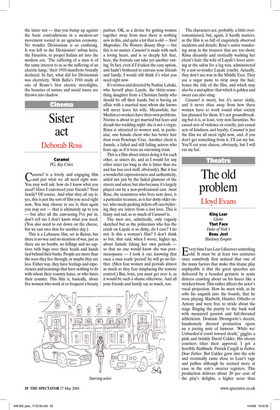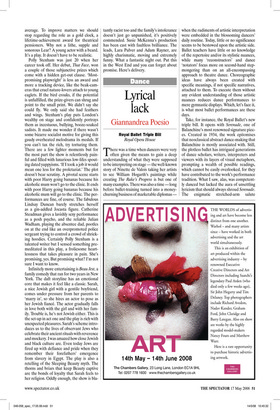The old problem
Lloyd Evans
King Lear Globe That Face Duke of York’s Beau Jest Hackney Empire
Every time I see Lear I discover something old. It must be at least two centuries since somebody first noticed that one of the many factors that make this titanic play unplayable is that the great speeches are delivered by a bearded geriatric in acute distress crawling about on his knees like a stricken bison. This rather affects the actor’s vocal projection. How he must wish, as he sobs his anguish into the boards, that he were playing Macbeth, Hamlet, Othello or Antony and were free to stride about the stage flinging the poetry to the back wall with measured passion and full-throated athleticism. Dominic Dromgoole’s decent, handsomely dressed production opens on a jarring note of humour. ‘While we/ Unburden’d crawl toward death,’ giggles a pink and twinkly David Calder. His sitcom courtiers titter their approval. I got a horrible flashback: Patrick Cargill in Father, Dear Father. But Calder grew into the role and eventually came close to Lear’s rage and pathos although he seemed more at ease in the role’s sweeter registers. This production delivers about 20 per cent of the play’s delights, a higher score than average. To improve matters we should stop regarding the role as a gold clock, a lifetime-achievement award for theatrical pensioners. Why not a lithe, supple and sonorous Lear? A young actor with a beard. It’s a play. It doesn’t have to be realistic.
Polly Stenham was just 20 when her career took off. Her debut, That Face, won a couple of those subjunctive prizes which come with a hidden get-out clause. ‘Mostpromising playwright’ is less an award and more a tracking device, like the beak-cameras that cruel nature-lovers attach to young eaglets. If the bird croaks, if the potential is unfulfilled, the prize-givers can shrug and point to the small print. We didn’t say she could fly. We only said she had feathers and wings. Stenham’s play puts London’s wealthy on stage and confidently portrays them as incestuous, bullying, booze-soaked sadists. It made me wonder if there wasn’t some bizarre socialist motive for giving this gaudy overheated melodrama its medals. If you can’t tax the rich, try torturing them. There are a few lighter moments but for the most part the show is relentlessly painful and filled with luxurious low-lifes spouting dated yuppyisms. ‘If I took a job it would mean one less for the proletariat.’ The plot doesn’t bear scrutiny. A pivotal scene starts with poor Harry going bananas because his alcoholic mum won’t go to the clinic. It ends with poor Harry going bananas because his alcoholic mum will go to the clinic. The performances are fine, of course. The fabulous Lindsay Duncan barely stretches herself as a gin-addled Jocasta figure. Catherine Steadman gives a lavishly sexy performance as a posh psycho, and the reliable Julian Wadham, playing the absentee dad, pootles on at the end like an overpromoted police sergeant trying to control a crowd of shrieking hoodies. Certainly Polly Stenham is a talented writer but I sensed something premeditated in this play, a frolicsome heartlessness that takes pleasure in pain. She’s promising, yes. But promising what? I’m not sure I want to know.
Infinitely more entertaining is Beau Jest, a family comedy that ran for two years in New York. The daft storyline has an emotional core that makes it feel like a classic. Sarah, a nice Jewish girl with a gentile boyfriend, comes under pressure from her parents to ‘marry in’, so she hires an actor to pose as her Jewish fiancé. The actor gradually falls in love both with the girl and with her family. Trouble is, he’s not Jewish either. This is the set-up in act one and the play is rich with unexpected pleasures. Sarah’s scheme introduces us to the lives of observant Jews who celebrate their ancient rituals with reverence and mockery. I was amazed how close Jewish and black culture are. Even today Jews are fired up with defiance and pride when they remember their forefathers’ emergence from slavery in Egypt. The play is also a retelling of the Sleeping Beauty myth. The thorns and briars that keep Beauty captive are the bonds of loyalty that Sarah feels to her religion. Oddly enough, the show is bla tantly racist too and the family’s intolerance doesn’t just go unpunished, it’s positively commended. Susie McKenna’s production has been cast with faultless brilliance. The leads, Lara Pulver and Adam Rayner, are highly charismatic, moving and extremely funny. What a fantastic night out. Put this in the West End and you can forget about promise. Here’s delivery.











































































 Previous page
Previous page